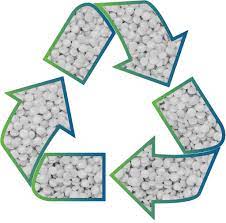Ask many of the world’s leading brands about their sustainable packaging plans and they will tell you: they aim to make their packaging 100% reusable or recyclable by 2025. More specifically, many plan to source post-consumer recycled (PCR) materials—such as post consumer recycled resin—to get there. This sentiment is echoed across the entire landscape of food and beverage, as well as personal and home care segments.
In fact, among companies in those segments, nearly half say post consumer recycled resin is playing a significant role in their sustainable packaging strategies, according to Jabil’s recent study. Consumer packaged goods companies have a strong tendency (64%) to incorporate post consumer material and other recycled content as part of their product-level initiatives. Download the full survey report.
While post consumer recycled resin seems to be the leading option to accomplish packaging sustainability in the industry, there are several considerations to make when sourcing PCR material:
1) How can I be sure my company is using 100% post consumer plastic?
There are four main plastics used in packaging: polyethylene (PE), polypropylene (PP), polystyrene (PS) and polyethylene terephthalate (PET). Currently, high density polyethylene (HDPE) and PET recycling are more common than others. The infrastructure is built to support the collection of these materials and many CPGs lead initiatives to educate consumers to recycle. PP is readily recyclable but needs more infrastructure and education around the material. Finally, PS is also recyclable as it is extremely tolerant to “re-melting,” but its collection presents difficulties due to its form factor.
Certain plastics are like oil and water—they don’t mix well. The contamination caused by their mixing, or worse yet, the addition of other factors (such as food, dirt, or other contaminants) can render the resins very difficult to reuse. The makeup of the post consumer resins can be a big obstacle in the industry’s endeavor to achieve a truly circular economy, which is a critical piece for packaging sustainability.
In addition, based on your company’s performance requirements of the product, the mixing of the materials can lead to further complications in achieving goals. Almost 60% of European plastics converting companies find it “hard” or “very hard” to reuse plastic scrap due to contamination, according to a European Plastics Converters Association study.
Then how can you ensure 100% purity for packaging materials?
The first step is to establish a set of recycled material goals for your product. Then, you need to partner with your supplier to evaluate and understand their sources and supply chain. They must have the appropriate quality controls and tests in place to ensure the material supplied meets your product’s specifications.
Therefore, it is imperative that you have full visibility into your supplier ecosystem and a strong understanding of how the post-consumer recycled plastic was sourced, processed and produced.
2) Does the PCR resin comply with regulations?
Not every type of recycled resin works for every use case or complies with applicable regulations.
In the United States, the FDA has guidelines for the use of recycled plastics in food packaging. Specifically, they have three concerns that:
- Contaminants from the recycled material may end up in the food packaging
- Non-regulated post-consumer materials may make their way into food packaging
- Adjuvants in the recycled materials may not comply with food-contact regulations
Europe has more stringent guidelines. Under a regulation set over a decade ago, only “food-contact materials and articles that contain recycled plastic obtained from an authorized recycling process” may be used in the EU.
It is very likely that in the future more industry standards will be developed, and perhaps also government regulation, to ensure the material really is what it should be. Brands once again can partner with governments worldwide to help shape regulation and drive post consumer recycled content forward.
Over the long term, this area will become more like medicine or food—when we go to a grocery or drug store, we hardly ever think about whether the medicine or food is “good” or “safe.” We rely on the system in the background which ensures that it is.
3) Where can I find steady sources of high-quality PCR resin?
Finding a steady source of high-quality post consumer recycled plastic is a difficult endeavor today. Consumers are not yet recycling enough plastic waste worldwide—which drastically impacts the supply. The reasons vary from geographically different regulations to the additional cost customers must occasionally incur to recycle. Furthermore, while many understand the importance of recycling, many are also confused on how to properly do it.
With such high demand for recycled materials, brands and packaging integrators must treat the sourcing of these resins as a partnership with their supplier, rather than a transactional exchange. Unlike sourcing virgin material, brands, converters and suppliers must work as a team and make the proper investments to build a viable infrastructure. Sometimes, that means launching community initiatives.
PepsiCo, for example, recognizes the importance of bringing all stakeholders together. To support the development of packaging sustainability, they launched PepsiCo Recycling, an initiative to improve plastics recycling infrastructure and raise awareness on the issue worldwide. With their partnerships through the program, they’ve provided recycling access to 33 million households across 700 communities in the U.S. since 2014, collecting more than 115 million pounds of plastic bottle and recyclables.
These types of partnerships and investments can help you reach your sustainable packaging goals while making a big difference for the environment. Watch Jabil’s documentary: The Sustainable Packaging Revolution for a better understanding of how integrators like Jabil, KW Plastics and Danimer Scientific are bringing innovative packaging solutions to the market.

